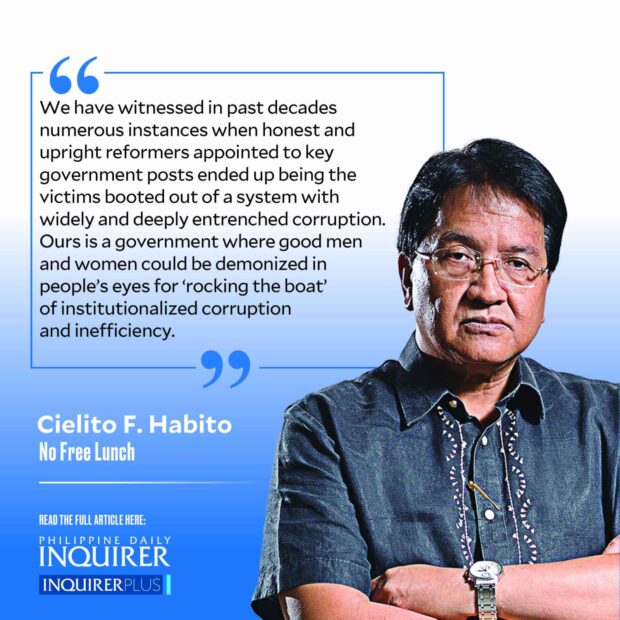Government is the problem
 In this present crisis, government is not the solution to our problem. Government is the problem.” Former United States president Ronald Reagan made this statement way back in January 1981 in his inaugural address, but it might as well be said now, of our own government.
In this present crisis, government is not the solution to our problem. Government is the problem.” Former United States president Ronald Reagan made this statement way back in January 1981 in his inaugural address, but it might as well be said now, of our own government.
Case in point: The surprising and disappointing slowdown of the economy in the second quarter was to a large extent due to a 7.1-percent drop in government consumption spending, and nearly flat government spending on infrastructure (0.8 percent). Our government couldn’t play its usual “pump-priming” role when the rest of the economy is flagging, because its own finances are tight, with government debt back up to a level beyond the “safe” 60-percent threshold. Yet through it all, our government has seen fit to create the Maharlika Investment Fund and divert into it substantial financial resources that could otherwise directly address urgent needs of our people and fuel growth of jobs and incomes at a time of global slowdown.
On a longer horizon, we have witnessed in past decades numerous instances when honest and upright reformers appointed to key government posts ended up being the victims booted out of a system with widely and deeply entrenched corruption. Ours is a government where good men and women could be demonized in people’s eyes for “rocking the boat” of institutionalized corruption and inefficiency. We’ve seen this happen in government offices perceived to be among the most corrupt and/or most inefficient and ineffective, such as the Bureau of Internal Revenue (BIR), Bureau of Customs (BOC), Department of Agriculture (DA), Department of Transportation (DOTr), and many more.
Names easily come to mind: Rene Bañez for BIR in 2002, John Philip “Sunny” Sevilla for BOC in 2015, Leocadio Sebastian for DA just last year, and lately, Cesar Chiong and Secretary Jaime Bautista for DOTr. For Bañez and Sevilla, pushing for drastic and fundamental reforms in the top two revenue-generating agencies of government proved fatal for their positions. As the late columnist Max Soliven once wrote: “Try to impose reforms in your agency or office, and you’re a ‘gone goose.’ Or politically, a dead duck.” He further wrote (in 2002): “[President Gloria Macapagal Arroyo] kicked out the president of the Social Security System Vitaliano Nañagas, because employees staged a so-called ‘people power’ series of demonstrations against him. For months, disgruntled and resentful members of the Department of Education ‘union’ mounted similar mass actions and demonstrations against Education Secretary Raul Roco (who was led to resign) … Now, owing to demonstrations and protests, BIR Commissioner Bañez has just lost his job.” All known to be good and upright men, they were portrayed as “bad guys” in a system captured by enemies of reform out to perpetuate a broken system.
Last year, highly respected and unassuming Dr. Leocadio Sebastian was suspended and publicly demonized (“thrown under the bus,” in the words of many who know him), as powerful interests were unhappy with a sugar importation order he issued that the President initially disowned, but later effectively upheld. Subsequent events and data proved the action to have been in order, but the harm to his person had been done, even as he has since been officially vindicated and vested with even greater authority at the DA.
The latest episode is the suspension, and now dismissal order by the Ombudsman, based on an anonymous complaint, on Manila International Airport Authority general manager Cesar Chiong. His sin? He reassigned some 285 airport personnel in an effort to improve efficiency at the airport. He has reaped praises for dramatic improvements in the Ninoy Aquino International Airport, which are clearly visible to any domestic or international air traveler into or out of the Naia. While I do not know Chiong personally, the wide support he appears to have from public stakeholders, including in the business community, suggests that he may yet be another case of a determined reformer being stopped in his tracks by enemies of reform. The same seems true with Bautista himself, who is seen to be the subject of a similar vilification campaign, apparently for stepping on the toes of entrenched vested interests in the DOTr.
One hears many much more such stories from various offices and levels of the government. How can positive change in the broken organizations that make up our government have a chance, when those who promise to bring reform from the top or from below are too easily devoured by those out to preserve the dysfunctional status quo? The solutions cannot come from the government, when government is the problem.
cielito.habito@gmail.com




















